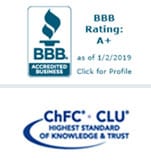For many investors, a fixed index annuity sounds like its own contradiction. Is it a traditional fixed annuity—a contract with an insurance company which guarantees the return of the principal investment plus a predetermined interest rate—or is it more like a variable annuity, whose value is tethered to the stock market? True to its name, the fixed index annuity is both. Fixed insofar as investors are guaranteed the return of their original principal, but with a variable annual growth linked to a stock market index such as the S&P 500. Due to their conservative nature and tax-deferred status, fixed index annuities are an increasingly attractive investment choice. However, like most retirement products, fixed index annuities are hardly one-size fits all investments. Read on for the top ten questions you should ask your financial advisor before you commit to a fixed index annuity.
1. How are returns calculated?
Just like their name, the return potential associated with fixed index annuities falls between fixed (less potential return, less risk) and variable (more potential return, more risk) annuities. Like a fixed annuity, many fixed index annuities offer a minimum guaranteed interest rate in addition to an interest rate derived from a market index. However, the indexed interest rate is often subject to a rate cap that limits your return. Rate caps typically fall between 4% and 6%. But what does that actually look like? Imagine: you’ve purchased a fixed index annuity tied to the S&P 500. The annuity has a 6% cap. During Year One, the S&P rises by 2.5%, so your annuity interest rate also rises by 2.5%. All gains are locked-in annually. In Year Two, a windfall occurs; the S&P rises 9.25%, yet, because of the cap, your interest rate tops out at 6%. At first, the cap rate might look like a rip-off, but it actually serves an important purpose: balance. In return for that cap, you secure your principal against losses when the index goes down. Thus, in Year Three, when the S&P falls by -6.75%, your earnings are 0% but you don’t lose a single cent.
Some fixed index annuities also feature a participation rate. A participation rate is the percentage of the index’s return that the insurance company credits to the annuity. So, an indexed annuity with no cap and a participation rate of 50% would see a return of 8% if the index went up 16%.
2. Is the insurance company offering this product reliable?
Unlike bonds and pensions, which are both reinforced by the Federal Government, annuities are backed by the strength of the carrier. That means that your annuity contract is as good as the insurance company behind it. As a result, if the insurance company that holds your annuity goes belly up, your money is going with it. Verify with your advisor that the company selling the annuity has a high Comdex ranking and a good reputation.
3. Should I add a rider?
Riders are optional features that can be included in an annuity—usually for an additional fee. Some riders will be worth the fee, while others will drain your assets without conferring comparable benefits. Often, whether or not a rider is worth your while depends on the particular annuity under consideration as well as how you intend to use it.
Income riders promise a guaranteed income for life once triggered. That means that during the withdrawal period, even in years when the crediting index falls (i.e., years the annuity would otherwise accrue 0% interest) you will still receive the predetermined interest outlined in your rider contract.
4. What will happen if I need to access my money before the surrender period ends?
The surrender period is a set period of time—usually 5-10 years—mirroring the term of the annuity. During the surrender period, most fixed index annuities will allow you to withdraw up to 10% of your account value each year. If you need to withdraw more than 10%, a surrender charge may be applied to your account, much like the early withdrawal penalty for a CD. Often, there are alternative withdrawal options that allow you to draw a regular income without surrender charges.
5. Is there a death benefit?
All fixed index annuities include a death benefit. This benefit allows you to select a beneficiary who will receive the remaining balance in your account at the date of death. The death benefit often takes the form of a lump sum payment.
6. Are there any additional fees or charges I should know about?
Transparency is the key word here. Fees can be a drag on performance. It’s important to learn up-front if there are any fees or charges that would impact your account.
7. Is the bonus credit worth it?
Some fixed index annuities offer to add a bonus to your contract value (usually between 2-7%) if you are willing to accept a longer surrender period or higher fees. Discuss with your financial advisor whether the value added to your account by the bonus credit will outweigh the cost of fees and a longer surrender period.
8. Which index will this product track?
Remember: when you buy a fixed index annuity, you are not purchasing actual shares or stocks in a company. You are making an agreement with an insurance company that, in exchange for allowing them to hold your principal for a certain number of years, you will receive an annual return derived from the performance of one or more stock market indexes.
9. What are the tax benefits and burdens associated with this product?
One of the major benefits of a fixed index annuity is its tax-deferred status. This means that during the accumulation phase when your investment is growing in value, you do not pay taxes on any earnings. If it’s a personal savings account, only the interest is taxed when you make a withdrawal. However, with an IRA, the full withdrawal will be taxed since this money was not taxed previously. You should also work with your advisor to avoid IRS penalties on withdrawals and required minimum distributions.
10. Does this annuity meet my needs?
This is the million-dollar question. In the end, only a financial professional with an in-depth knowledge of available products and your unique financial situation can guide you here.


Sara McKinney
saractag@gmail.com
Sara is a recent graduate of Kalamazoo College and a new addition to the Cowen Team. Her responsibilities include IT support, event planning, and general administrative assistance.




